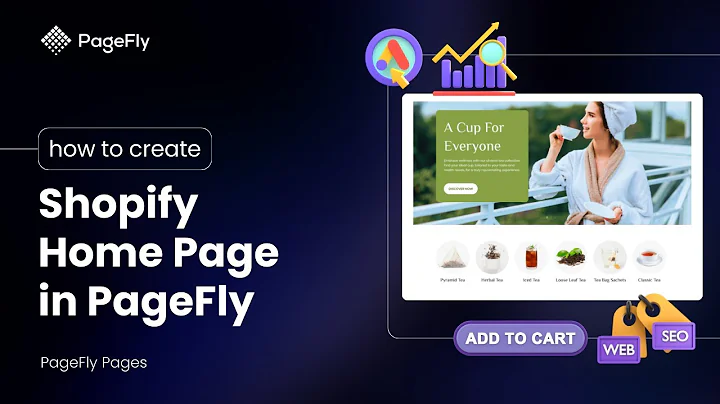Shopify vs Bigcommerce: Choose the Best E-commerce Platform
Table of Contents
- Introduction
- Comparison of Shopify and Bigcommerce
- Features
- Costs
- Customer Support
- User Experience
- Shopify
- Overview
- Pros
- Cons
- Bigcommerce
- Overview
- Pros
- Cons
- Pricing
- Shopify Pricing
- Bigcommerce Pricing
- Themes
- Shopify Themes
- Bigcommerce Themes
- Shopping Carts
- Shopify Shopping Cart
- Bigcommerce Shopping Cart
- Payment Options
- Shopify Payment Providers
- Bigcommerce Payment Options
- Search Engine Optimization (SEO)
- Shopify SEO Features
- Bigcommerce SEO Features
- Conclusion
Shopify vs Bigcommerce: Which E-commerce Platform is Right for You?
In today's digital age, having a strong online presence is crucial for any business. As a result, e-commerce platforms have become fundamental tools for businesses of all sizes. Shopify and Bigcommerce are two leading names in the e-commerce industry, offering users the ability to create and manage their online stores. In this article, we will compare the features, costs, customer support, and user experience of Shopify and Bigcommerce. By the end, you'll have a better understanding of which platform is best suited for your business's needs.
Shopify
Shopify is a subscription-based e-commerce platform that allows users to build and customize their online store. Founded in 2004 by Toby Luke, the platform has grown to support millions of merchants worldwide. Shopify is known for its user-friendly interface and beautiful themes, making it an ideal choice for beginners without any coding experience. However, its reliance on third-party apps and transaction fees can be seen as drawbacks.
Pros of Shopify
- Tons of industry-specific themes.
- Easy to use, even for beginners.
- Three-day free trial followed by three months for just one dollar.
Cons of Shopify
- Transaction fee of two percent.
- Over-reliance on third-party apps.
- Limited staff accounts.
Bigcommerce
Bigcommerce, on the other hand, is a SAS (software-as-a-service) e-commerce platform that provides robust features for building and hosting online stores. It caters to startups, mid-sized businesses, and even large companies like Ben & Jerry's and Harley Davidson. Bigcommerce offers a powerful and scalable sales system, making it an excellent choice for businesses with ambitious growth plans. However, its complexity and limited free design templates may pose challenges for beginners.
Pros of Bigcommerce
- Highly scalable e-commerce features.
- No transaction fee.
- 24/7 customer support.
- Solid SEO features.
Cons of Bigcommerce
- Not as beginner-friendly as Shopify.
- Automatically upgrades to more expensive plans based on revenue.
- Limited free design templates.
Both Shopify and Bigcommerce are priced similarly, with plans starting at $39 per month for basic features and ranging up to $399 per month for advanced capabilities. However, the specific features and limitations vary between the two platforms. Shopify offers an extensive range of over 8,000 paid and free apps in its app store, allowing users to customize their online stores and scale their businesses. In contrast, Bigcommerce comes with more built-in features, requiring a steeper learning curve but reducing the reliance on third-party apps.
When it comes to themes, Shopify offers 83 industry-specific themes, catering to various industries and design preferences. Bigcommerce, on the other hand, provides 12 free themes and 150 themes ranging in price from $150 to $300. Both platforms allow users to customize these themes to fit their brand.
Shopping cart functionality is crucial for a seamless customer experience, and both Shopify and Bigcommerce offer robust features to ensure this. Shopify relies heavily on third-party apps for advanced discount functionality, while Bigcommerce has built-in tools for creating cart-level discounts, coupon codes, and customer loyalty programs.
Payment options are another significant consideration. Shopify provides over 100 payment providers, allowing customers to use their preferred payment methods. Bigcommerce, although offering fewer options, still provides 65 pre-integrated online payment options.
Search engine optimization (SEO) is vital for driving organic traffic to your online store. Both Shopify and Bigcommerce offer SEO features, but there are variations in their out-of-the-box capabilities and the availability of third-party apps to enhance SEO efforts. Bigcommerce provides more robust built-in SEO features, while Shopify offers a broader selection of third-party apps.
In conclusion, choosing between Shopify and Bigcommerce depends on your specific business needs and preferences. Shopify is user-friendly and has a wide array of industry-specific themes, making it an excellent choice for beginners. On the other hand, Bigcommerce offers more built-in features, scalability, and comprehensive SEO capabilities, making it suitable for businesses with growth aspirations.
Regardless of which platform you choose, both Shopify and Bigcommerce offer free trials, allowing you to experiment and determine which one works best for your company. Don't forget to use the provided link in the description to sign up for Shopify and get three months for just one dollar. Enter the world of e-commerce with confidence, knowing that you've made an informed decision for your business's success.
Highlights:
- Shopify and Bigcommerce are subscription-based e-commerce platforms.
- Shopify is known for its user-friendly interface and beautiful themes.
- Bigcommerce offers a powerful and scalable sales system.
- Shopify has over 8,000 paid and free apps in its app store.
- Bigcommerce has more built-in features and robust SEO capabilities.
- Both platforms offer free trials to help you make an informed decision.
- Use the provided link in the description to get three months of Shopify for just one dollar.
FAQ
Q: What is the main difference between Shopify and Bigcommerce?
A: The main difference lies in the platform's approach. Shopify focuses on simplicity and user-friendliness, relying on third-party apps for additional features. Bigcommerce, on the other hand, offers more built-in features, making it a scalable solution for businesses with growth aspirations.
Q: Can I customize the themes on both platforms?
A: Yes, both Shopify and Bigcommerce allow users to customize their themes to match their brand and design preferences.
Q: Do both platforms offer free trials?
A: Yes, both Shopify and Bigcommerce offer free trials to help users determine which platform is the best fit for their business.
Q: Can I accept different payment methods on both platforms?
A: Yes, both platforms provide multiple payment options, allowing customers to use their preferred payment methods.
Q: Which platform is more suitable for beginners?
A: Shopify is generally considered more user-friendly, making it an ideal choice for beginners without any coding experience.






















